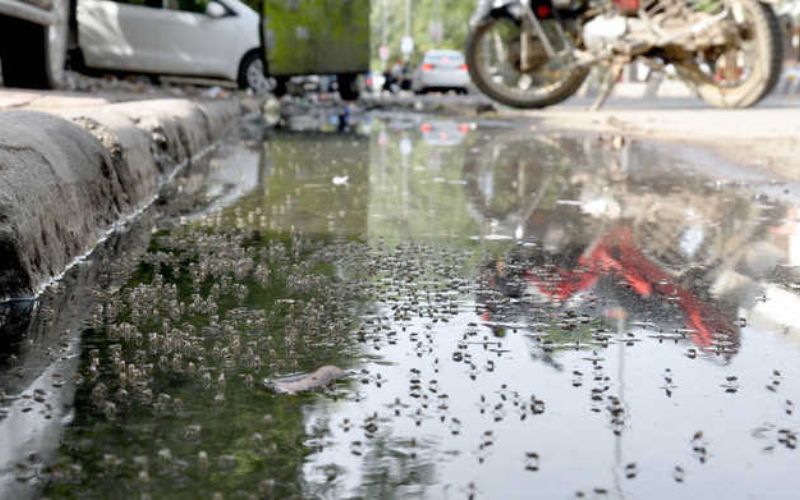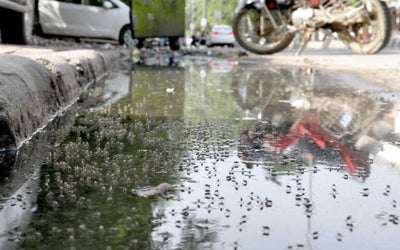Foul Odours, Mosquitoes & Waterlogging: Stop Them with Proper Septic Tank Cleaning

You clean your bathroom, spray a little freshener, maybe even light up an incense stick and yet, the smell creeps back. Step outside, and the street corner isn’t much better: drains overflow, mosquitoes buzz in the humid air, and after one heavy shower, waterlogging makes the place look like a mini pond.
It may feel random, but it is not. If you don’t know, nearly 70% of urban sewage goes untreated, which means the problem is baked right into the system. Foul odours, mosquitoes, and waterlogging aren’t three different battles; they’re three symptoms of the same hidden issue.
So, where exactly does it start? And more importantly, how do you stop it before it turns your home into a breeding ground for smells and pests? Let’s dig in.
Why Do These Problems Show Up Together in Indian Homes?
Begin with untreated sewage. India produces almost 72,368 million liters of sewage each day, but only 28% is treated. The rest flows into open drains, septic tanks, or groundwater, creating perfect conditions for foul odours and waterlogging. That same stagnant waste becomes a breeding ground for mosquitoes, which explains why mosquito-borne diseases like dengue and malaria spike every monsoon.
Now focus on the house. Research has discovered that in most Indian homes, poor maintenance of septic tanks results in gases such as hydrogen sulfide percolating back into bathrooms. Regular septic tank cleaning is often overlooked, which allows gases and odours to build up.
That's the smell of "rotten eggs" that parents complain about. If septic tanks overflow, which happens even more frequently in higher-density areas, excessive wastewater settles into lanes or yards where it typically pools locally during these events.
This is true whether you have a traditional concrete tank or a modern plastic septic tank, which can also suffer from sludge buildup if neglected.
Here’s the cycle:
- Stagnant wastewater = smell of rotten eggs from decaying organic matter.
- That same stagnant water = a place for mosquito eggs to hatch in as soon as 48 hours.
- Seepage and septic tank overflow = flooding in your neighborhood during rain.
That's why these three issues almost always appear together. They're not independent issues; they're manifestations of how wastewater is being managed (or more accurately, mismanaged) in Indian residences and neighborhoods.
The Hidden Source: How Septic and Drainage Systems Trigger It All
Most families observe the odour, the puddles, or the mosquitoes, but hardly ever consider the septic tank or ground pipes as the true beginning point. The fact is, when these systems are left alone, they silently trigger a chain effect:
- Sludge accumulation in septic tanks diminishes holding capacity, compelling wastewater to bulge out into open spaces rather than filtering accordingly. Routine septic tank cleaning helps prevent sludge buildup, keeping the system functional and odour-free.
- Blocked drains and clogged soak pits keep water pooled at the surface, resulting in standing water for days after the rain and heavy use of facilities.
- Leaks from faulty vents or cracks allow gas to pass as well, including hydrogen sulfide and methane, penetrating living areas and making bathrooms smell like rotten eggs - even after scrubbed with bleach!
Since they occur behind closed doors, family members tend to accuse dirt or surface water of causing the issue. Truth be told, septic and drainage system hidden mechanisms are the actual culprit, and without fixing them, the cycle continues regardless of how frequently the floors are cleaned.
Even a plastic septic tank requires routine inspection and septic tank cleaning to avoid these hidden hazards.
5 Practical Ways to Prevent the Problem at the Source
When foul odours, mosquito clouds, or sudden waterlogging appear, they don't tend to arrive singly and they nearly always trace back to your septic or drain system. The secret isn't waiting for a crisis, but understanding the small, practical steps that keep the system functioning well
- Regularly clean septic tanks. Specialists advise desludging every 2–3 years for urban homes. Professional septic tank cleaning services can make this task easier and more effective, especially for larger tanks.
- Keep drain vents open and unclogged. A blocked vent traps gases inside and pushes them back into the bathrooms. Check that vent pipes aren’t capped or choked with debris.
- Avoid flushing non-degradable waste. Pads, diapers, cloth, and even wet wipes clog the septic outlet and soak pit, creating both waterlogging and odour. Municipal surveys in Nagpur showed 30% of blockages came from such waste.
- Prevent water stagnation around tanks and pits. After rains or heavy water use (common during festive cleaning), make sure no water pools form around septic systems, as these become instant mosquito breeding spots.
- Maintain proper soak pit design and drainage slope. A faulty soak pit or uneven slope pushes wastewater back to the surface. If waterlogging is frequent, it may be time for a design check.
- Use Bioclean’s septic tank cleaning powder for long-term prevention. Instead of waiting for a festival-time emergency, add a preventive layer. Bioclean’s enzyme-based septic solutions keep tanks active, reduce odour, and cut mosquito breeding at the root.
Final Word
Foul odours, mosquito breeding, and waterlogging are never random accidents; they’re signs that your septic or drainage system is under strain. If we don’t address these “small” problems, they will increase stealthily and become larger health and hygiene problems in your home. The simplest defense is to provide regular, preventive maintenance to keep your waste system functioning and balanced, rather than waiting for a costly emergency.
That is where products, like Bioclean Septic Tank Cleaning Powder, can help. Powered by natural enzymes and safe bacteria, Bioclean Septic Tank Cleaning Powder works to naturally break down waste, which keeps septic tanks clog-free and reduces the very things we unintentionally introduce to our environment that promote terrible odours, stale standing water, and contribute to the breeding of mosquitoes.
👉 Explore Bioclean’s range of septic care solutions to keep your system healthy year-round, before small problems become household headaches.




